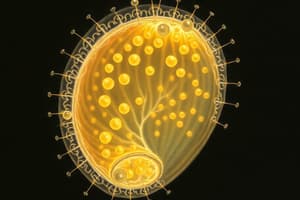Podcast
Questions and Answers
What is the function of the oral cilia in Paramecium?
What is the function of the oral cilia in Paramecium?
- To expel undigested food
- To control cell functions
- To assist in reproduction
- To move food towards the oral groove (correct)
Which structure connects the vestibule to the cytostome?
Which structure connects the vestibule to the cytostome?
- Buccal Cavity
- Food Vacuole
- Cytopyge
- Cytopharynx (correct)
What role does the macronucleus play in Paramecium?
What role does the macronucleus play in Paramecium?
- Controls the day-to-day functions of the cell (correct)
- Expels excess water
- Facilitates reproduction
- Involves in food digestion
Which feature is responsible for expelling undigested food from the cell?
Which feature is responsible for expelling undigested food from the cell?
What is the primary function of the contractile vacuole in Paramecium?
What is the primary function of the contractile vacuole in Paramecium?
Flashcards are hidden until you start studying
Study Notes
Structure of Paramecium
- Pellicle: Elastic, colorless membrane providing structure and protection to the cell.
- Ectoplasm: Outer cytoplasmic layer, important for maintaining shape and containing organelles.
- Endoplasm: Inner cytoplasmic layer, involved in transport and biochemical activities.
- Oral Groove: Large ventral depression that aids in the ingestion of food.
- Vestibule: Tubular structure connecting the oral groove to the cytostome (mouth).
- Oral Cilia: Hair-like structures that facilitate movement of food particles towards the oral groove.
- Buccal Cavity: Space between the oral groove and cytostome that helps in food processing.
- Cytopharynx: Tube linking the vestibule to the cytostome for food passage.
- Cytostome: Mouth of the Paramecium, where food enters the digestive system.
- Food Vacuole: Spherical sac that stores ingested food for digestion.
- Contractile Vacuole: Large sac that removes excess water, maintaining osmotic balance.
- Macronucleus: Large nucleus overseeing general cell functions and daily activities.
- Micronuclei: Multiple small nuclei involved in the reproductive process of the organism.
- Cytopyge: Small ventral opening used to expel waste (undigested food) from the cell.
- Radial Canals: Channels extending from the contractile vacuole for efficient water expulsion.
- Anterior Contractile Vacuole: Smaller contractile vacuole located near the front, assisting in water regulation.
Studying That Suits You
Use AI to generate personalized quizzes and flashcards to suit your learning preferences.




